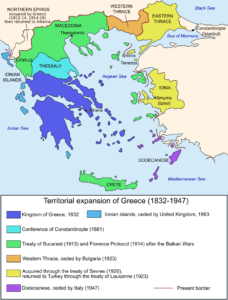The Nazis proceeded to administer Athens and Thessaloniki, while other regions of the country were given to Nazi Germany’s partners, Fascist Italy and Bulgaria. The occupation brought about terrible hardships for the Greek civilian population. Over 100,000 civilians died of starvation during the winter of 1941–1942, tens of thousands more died because of reprisals by Nazis and collaborators, the country’s economy was ruined, and the great majority of Greek Jews (tens of thousands) were deported and murdered in Nazi concentration camps. The Greek Resistance, one of the most effective resistance movements in Europe, fought vehemently against the Nazis and their collaborators. The German occupiers committed numerous atrocities, mass executions, and wholesale slaughter of civilians and destruction of towns and villages in reprisals. In the course of the concerted anti-guerrilla campaign, hundreds of villages were systematically torched and almost 1 million Greeks left homeless. In total, the Germans executed some 21,000 Greeks, the Bulgarians 40,000, and the Italians 9,000.

Following liberation and the Allied victory over the Axis, Greece annexed the Dodecanese Islands from Italy and regained Western Thrace from Bulgaria. The country almost immediately descended into a bloody civil war between communist forces and the anti-communist Greek government, which lasted until 1949 with the latter’s victory. The conflict, considered one of the earliest struggles of the Cold War, resulted in further economic devastation, mass population displacement and severe political polarization for the next thirty years.
Although the post-war decades were characterised by social strife and widespread marginalisation of the left in political and social spheres, Greece nonetheless experienced rapid economic growth and recovery, propelled in part by the U.S.-administered Marshall Plan. In 1952, Greece joined NATO, reinforcing its membership in the Western Bloc of the Cold War.
Military Regime (1967–74):
King Constantine II‘s dismissal of George Papandreou’s centrist government in July 1965 prompted a prolonged period of political turbulence, which culminated in a coup d’état on 21 April 1967 by the Regime of the Colonels.

Under the junta, civil rights were suspended, political repression was intensified, and human rights abuses, including state-sanctioned torture, were rampant. Economic growth remained rapid before plateauing in 1972. The brutal suppression of the Athens Polytechnic uprising on 17 November 1973 set in motion the events that caused the fall of the Papadopoulos regime, resulting in a counter-coup which overthrew Georgios Papadopoulos and established brigadier Dimitrios Ioannidis as the new junta strongman. On 20 July 1974, Turkey invaded the island of Cyprus in response to a Greek-backed Cypriot coup, triggering a political crisis in Greece that led to the regime’s collapse and the restoration of democracy through Metapolitefsi.
Third Hellenic Republic:
The former prime minister Konstantinos Karamanlis was invited back from Paris where he had lived in self-exile since 1963, marking the beginning of the Metapolitefsi era. The first multiparty elections since 1964 were held on the first anniversary of the Polytechnic uprising. A democratic and republican constitution was promulgated on 11 June 1975 following a referendum which chose to not restore the monarchy.
